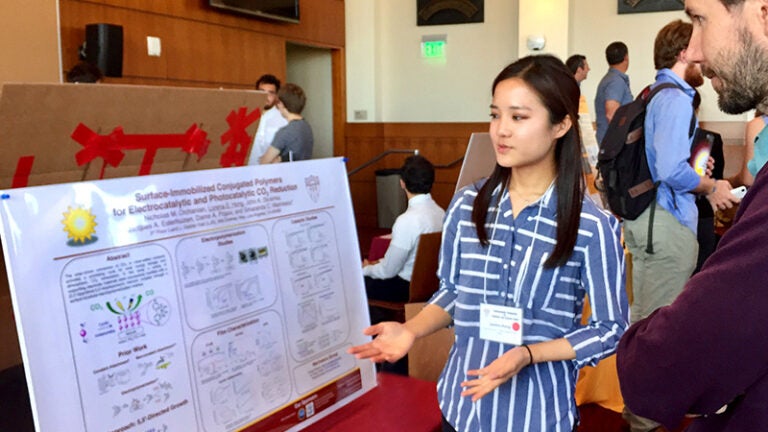
Solar energy research takes center stage
Lorena Hong didn’t hesitate when asked why the solar energy conversion research she has been working on for the past year is so important.
“Since we’re eventually going to run out of fossil fuels, we need to look at sources of renewable energy, and solar energy is one of the most promising,” she said. “We have a vision of how to store that energy in chemical bonds.”
Hong was presenting her work at the USC Undergraduate Symposium for Scholarly and Creative Work. Modeled on a professional conference poster session, the annual event challenges hundreds of young researchers to describe their studies and field questions from USC professors roaming the room.
A junior majoring in chemistry at USC Dornsife College of Letters, Arts and Sciences, Hong has performed 10 to 12 hours of research weekly in Assistant Professor of Chemistry Smaranda Marinescu’s lab.
One of Hong’s toughest research obstacles was an elusive synthesis that required Hong and her mentor, graduate student Nicholas Orchanian, to set up day-long reactions, only to see them fail time and again.
“It taught me a lot about patience,” Hong said. “It helped me accept having to do the same thing again and again and keep doing it carefully enough to figure out what was not working.”
After weeks of experimentation, Hong and Orchanian finally succeeded. The work contributed to a peer-reviewed paper published in Applied Energy Materials. Hong is a co-author.
The ongoing research aims to build assemblies of molecules to harvest solar energy and store it in chemical bonds, analogous to how plants capture the sun’s energy through photosynthesis. But where plants turn carbon dioxide into sugars, the materials developed here convert carbon dioxide to carbon monoxide, a chemical useful for the production of liquid fuels. Success could lead to the creation of fuels in a carbon neutral process that doesn’t release new greenhouse gases into the atmosphere.
“I’ve always liked chemistry,” said Hong. “I think it definitely helped me learn how to think critically. I feel I’m learning how to troubleshoot and figure out how I can find solutions and work independently.” Hong hopes to enroll in an M.D./Ph.D. program so she can pursue graduate science studies and medicine. She is one of five chemistry undergraduates to receive a Morrisroe Family Chemistry Undergraduate Research Fellowship this year. The funding augments undergraduate research programs within USC Dornsife.
“The fellowships make it possible for chemistry majors to participate in actual research projects, providing them with experiential tools to apply classroom learning towards tackling real-world problems,” said Peter Qin, professor of chemistry and biological sciences and vice chair for chemistry undergraduate curriculum.